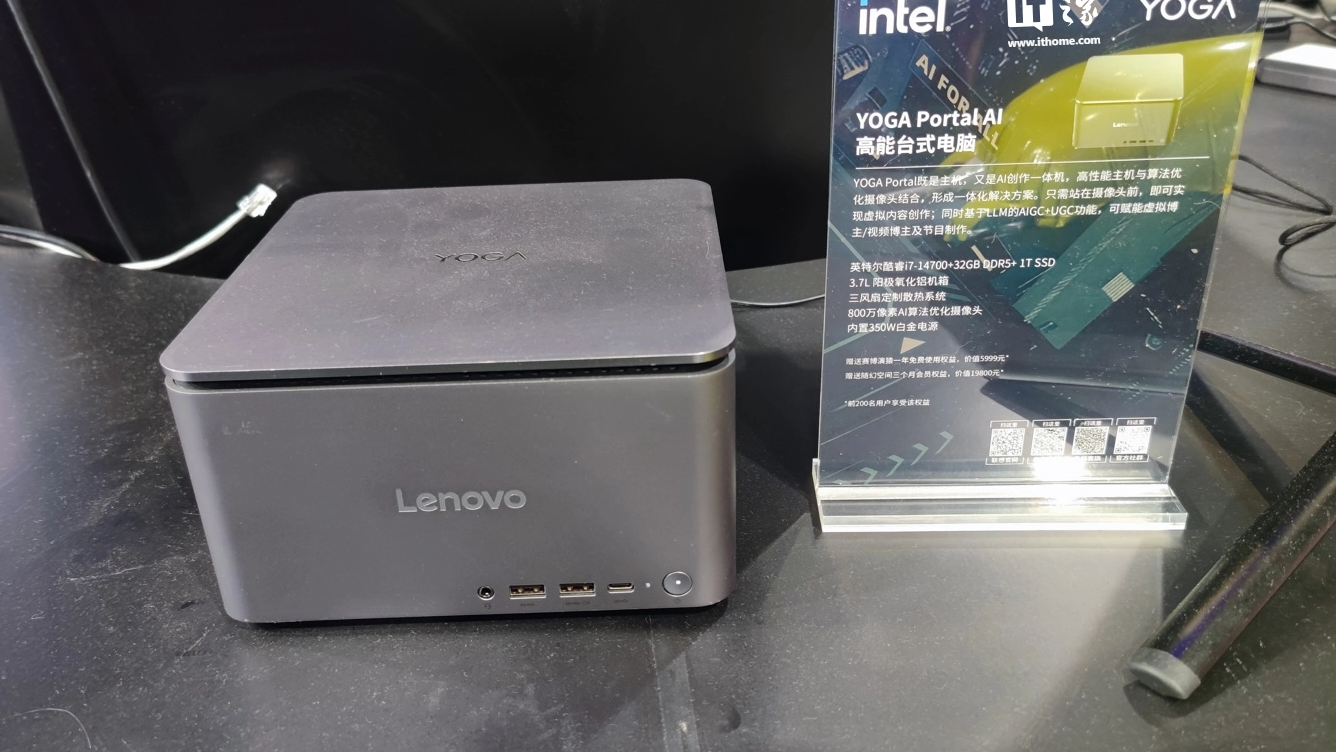Lenovo to launch Yoga Portal AI 3.7-liter mini PC overseas — powered by 14th Gen Intel desktop CPUs, it looks just like the ThinkCentre Neo Ultra
The "AI" comes from the integrated 8MP camera, not from an NPU or GPU.

Lenovo appears ready to re-release its Lenovo ThinkCentre Neo Ultra mini PC overseas, with newly updated Yoga Portal AI branding, based on information from Chinese hardware news site ITHome. The Lenovo Yoga Portal is set to be released in approximately four days, on July 27, while the ThinkCentre Neo Ultra was shown at CES 2024 and officially announced just under three weeks ago (July 3) as a direct competitor to the Mac Studio, albeit seemingly limited to enterprise customers only.
Both Lenovo mini PCs use desktop Intel CPUs and CPU sockets, which should make CPU as well as RAM and storage fully user-upgradable, which isn't common in this form factor. The image lists a Core i7-14700, 32GB of DDR5 memory, and a 1TB SSD as one configuration, though there will certainly be others.
Lenovo Yoga Portal AI vs ThinkCentre Neo Ultra Confirmed Specs
| Row 0 - Cell 0 | Lenovo ThinkCentre Neo Ultra | Lenovo Yoga Portal |
| CPU | Intel Core i5-14500; 14 Cores (6P+8E) at up to 5 GHz | Intel Core i7-14700; 20 Cores (8P+12E) at up to 5.4 GHz |
| GPU | Nvidia RTX 4060 | Unlisted |
| Storage | Up to 4TB NVMe | 1 TB NVMe |
| RAM | Up to 64 GB DDR5-5200 MT/s | 32 GB DDR5, unspecified MT/s |
| Wireless Specifications | Optional Wi-Fi 7 support | Unknown |
| Integrated PSU | 350W PSU (Unconfirmed Efficiency, likely 80+ Platinum) | 350W PSU (80+ Platinum) |
Now, where things get a little weirder is comparing the confirmed specifications between the two Mini PCs. Both seem at least superficially targeted at AI content production, but the ThinkCentre Neo Ultra is the only one of the pair confirmed to include an RTX 40-series GPU, specifically the laptop variant. The Neo Ultra also seems to ship with a slightly weaker CPU.
None of the currently-available information on the Lenovo Yoga Portal AI indicates its GPU spec, which could potentially mean it's relying entirely on integrated graphics. That would be far from ideal, especially for anything even remotely related to AI workloads. Hopefully this is just an oversight that will be addressed by its official launch time on July 27.
In any case, the compact 3.7-liter form factor seems to be a major selling point for both of these devices, allowing full Intel desktop CPUs and respectable expansion options while being much smaller than your typical mini-ITX case. The ThinkCentre Neo Ultra's confirmed rear I/O includes 4 DisplayPort outputs, 2 HDMI outputs, 4 USB-A ports, and 1 full-size Ethernet port.
The Yoga Portal's rear I/O remains unconfirmed and unpictured, but we expect it to be nearly identical considering how much of the form factor is shared. Front I/O seems identical between both units, with two USB-A ports, one USB-C port, and a single 3.5mm audio jack all flanked by the power button on the bottom-right corner.
One highlighted feature that sticks out about the Yoga Portal that seemingly isn't present in the ThinkCentre Neo Ultra is the inclusion of an 8 megapixel webcam with AI optimizations. A Google translation of the info placard reads, "Yoga Portal is both a host and an all-in-one AI creation machine. The high-performance host is combined with an algorithm-optimized camera to form an integrated solution. Just stand in front of the camera to create virtual content; at the same time, based on LLM's AIGC+UGC function, it can empower virtual bloggers/video bloggers and program production."
That's a lot of marketing speak that doesn't really say much about how well the AI features might work in practice. Again, the lack of an apparent GPU spec on the Yoga Portal makes the AI branding feel more like an afterthought for marketing purposes. Regardless, we expect to learn more about the Yogo Portal within the next week or so.
Get Tom's Hardware's best news and in-depth reviews, straight to your inbox.

Christopher Harper has been a successful freelance tech writer specializing in PC hardware and gaming since 2015, and ghostwrote for various B2B clients in High School before that. Outside of work, Christopher is best known to friends and rivals as an active competitive player in various eSports (particularly fighting games and arena shooters) and a purveyor of music ranging from Jimi Hendrix to Killer Mike to the Sonic Adventure 2 soundtrack.